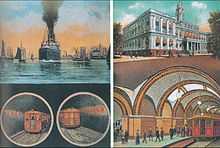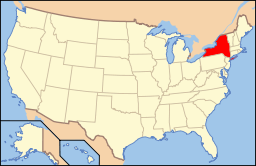Joralemon Street Tunnel
The Joralemon Street Tunnel, originally called the Brooklyn-Battery Tunnel,[3] carries the 4 5 trains of the IRT Lexington Avenue Line of the New York City Subway under the East River from the Bowling Green neighborhood (State Street) in Manhattan to Joralemon Street and Willow Place in Brooklyn. It was the first underwater subway tunnel connecting Manhattan and Brooklyn, with construction taking place between 1903 and 1907.[4]
History
The tunnel was constructed using the shield method and consists of two parallel cast iron tubes 2,170 feet long.[5] Construction problems led to alignment issues, resulting in the reconstruction of large segments of the tunnel to ensure safe subway operations. A construction accident on March 28, 1905 in the pressurized tunnel, led to a blowout which propelled a worker through the mud and 40 feet into the air.[6] The construction of the tunnel also saw the conversion of 58 Joralemon Street into a fan plant (a type of ventilation building) and emergency exit for the IRT subway system.[7] Clifford Milburn Holland served as the assistant engineer during the construction of the tunnel.[8] The first train ran through the Joralemon Street Tunnel to Brooklyn about 12:45 a.m. on January 9, 1908.[1]
The tunnel was the site of a derailment on March 17, 1984.[9]
The Joralemon Street Tunnel was one of seven East River subway tunnels flooded on October 29, 2012 as Hurricane Sandy's storm surge inundated Lower Manhattan. The Joralemon and Rutgers Street Tunnel were MTA's priority to drain and return to operations, as they carry some of the system's busiest routes.[10]
The storm water was cleared from the tunnel on October 31,[11][12] inspected and awaiting Con Edison service to be restored.[13] Full-length subway service through the tunnel was restored at 10:00 am on November 3.[14]
References
- ↑ 1.0 1.1 "Brooklyn Joyful Over Its Tunnel". The New York Times. January 10, 1908. Retrieved 2010-03-06.
- ↑ "National Register Information System". National Register of Historic Places. National Park Service. 2007-01-23.
- ↑ New York City Transit: A Memorandum Addressed to the Public Service Commission of the First District. City Club of New York. 1907. Retrieved 2012-11-05.
- ↑ Gasparini, D. A. (February 2006). "Battery-Joralemon Street Tunnel". Journal of Performance of Constructed Facilities (American Society of Civil Engineers) 20 (1): 92–107. doi:10.1061/(asce)0887-3828(2006)20:1(92). Retrieved 2007-10-12.
- ↑ Wills, Zachery. "The Tunnels of the East River". Retrieved 2012-11-05.
- ↑ "The Geyser Riders". Retrieved 2012-11-05.
- ↑ John Freeman Gill (2004-12-26). "A Puzzle Tucked Amid the Brownstones". The New York Times. Retrieved 2012-11-15.
- ↑ Aronson, Michael (June 15, 1999). "The Digger Clifford Holland". Daily News (New York). Retrieved 2010-07-02.
- ↑ Derailment of New York City Transit Authority Subway Train in the Joralemon Street Tunnel New York March 17, 1984. United States National Transportation Safety Board. 1985. Retrieved 2012-11-05.
- ↑ Donohue, Pete (November 2, 2012). "Repairing the New York subway system after Hurricane Sandy may be the MTA's biggest task yet". New York Daily News. Retrieved 2012-11-05.
- ↑ Fermino, Jennifer (October 31, 2012). "Slog to work (if you're lucky)". New York Post. Retrieved 2012-11-05.
- ↑ Kabak, Benjamin (October 31, 2012). "Limited subway service to return to 14 lines tomorrow". 2nd Ave. Sagas. Retrieved 2012-11-05.
- ↑ Kabak, Benjamin (November 2, 2012). "Sandy Updates: Friday morning train service and news & notes". 2nd Ave. Sagas. Retrieved 2012-11-05.
- ↑ "MTA Photos". MTA. November 3, 2012. Retrieved 2012-11-05.
New York City Historic Sites |
|---|
| | | |
|
|
|---|
| | Topics | | |
|---|
| | Lists by county | |
|---|
| | Lists by city | |
|---|
| | Other lists | |
|---|
|
-
 Category:National Register of Historic Places in New York Category:National Register of Historic Places in New York
-
 Portal:National Register of Historic Places Portal:National Register of Historic Places
|
|


